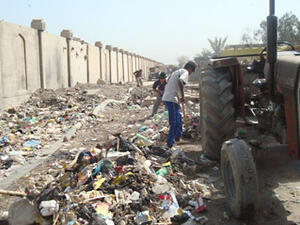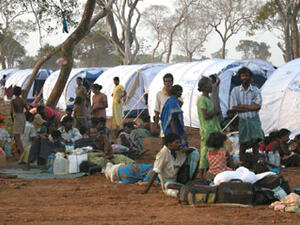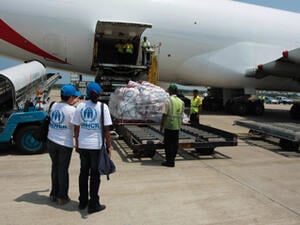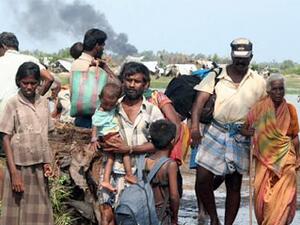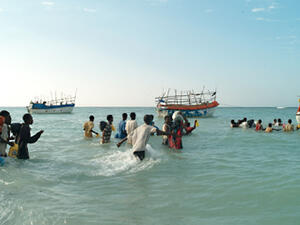Another 1 million Afghan refugees are likely to return home by 2006
Another 1 million Afghan refugees are likely to return home by 2006

Under its house-building programme, UNHCR provides tool kits and construction items like beams and window frames, while beneficiaries contribute most of the labour.
BRUSSELS, Feb. 17 (UNHCR) - More than 1 million Afghan refugees are likely to return to Afghanistan in two years with prospects of improved security, but the United Nations High Commissioner for Refugees, Ruud Lubbers, says planning should begin soon for those who wish to remain in Pakistan and Iran.
Speaking in Brussels on Wednesday at a high-level meeting of officials from Afghanistan, Iran and Pakistan, Lubbers expressed appreciation to donors for their assistance in the return of more than 3.5 million refugees to Afghanistan since a voluntary repatriation programme began in 2002 following the fall of the Taliban regime.
He said at the meeting co-chaired by UNHCR and the European Commission that it is "absolutely crucial" that donor commitment to the Afghan returns remains high, saying that successful integration is a longer task. "Millions of Afghans have come back to help rebuild their country and we must continue to help them help themselves," he said.
The meeting discussed the options available to Afghans refugees, conditions of return in Afghanistan, as well as the broader issue of how to manage population movements within the region. Last year alone, UNHCR helped in the return of more than three-quarter of a million Afghan refugees. There are between two and three million Afghans still in Iran and Pakistan.
Lubbers later told reporters that voluntary repatriation remains his top priority, and that there is still the potential for large numbers to return. He said more than half a million people could return this year from Iran and Pakistan, and a similar number in 2006.
"In the area of security, we have seen improvements in the past few months. It is a step by step process, but slowly we are getting there," he said.
Some donor countries said the situation in Afghanistan has improved enough that it has become possible to discuss a future transition from humanitarian assistance to development activities. Several key sectors were identified, notably the need for urban development but also for strengthening agriculture and the good management of water resources.
The High Commissioner also said that there was a need to start thinking of solutions for Afghans who have become so well integrated in their adopted country that they may not wish to return to their homeland. Some refugees have lived in Iran or Pakistan for more than two decades. Some have married there and have become productive members of the society they live in.
"Voluntary repatriation is the preferred solution,' said Lubbers, "but in some cases it may not be appropriate, and we need to start planning ahead and find solutions for those Afghans who will remain in Iran and Pakistan once the voluntary repatriation operation is over."
Iran and Afghanistan have shown great generosity in harbouring Afghan refugees since war broke out in their country more than a quarter of a century ago. The two nations have also benefited from the presence of Afghans on their territory. In Iran, Afghans play an important role in the economy, notably in the construction and agriculture sectors. The High Commissioner said it was important to develop a suitable regional migration framework.
"We think that it is possible to achieve regional success," he added, "not only in repatriation but also in building a win-win situation between Afghanistan, Iran and Pakistan, the focus being on economic cooperation and development."
To help develop such long-term policies, the government of Pakistan and UNHCR will later this month conduct a nationwide census of all Afghans living in Pakistan. The census will record vital information such as date of arrival, place of origin and of current residence, and intention to repatriate. It will provide the first comprehensive picture of the number and current activities of the Afghans who arrived in Pakistan since their country dissolved into war a quarter of a century ago. In Iran there are currently 960,000 Afghan refugees, and pre-census estimates put the Afghan population in Pakistan at 1.2 million in the camps plus an indeterminate number living in urban areas.
Afghanistan, Iran and Pakistan have agreed to continue consultations with UNHCR and donor countries on this issue. Another meeting is scheduled for later this year.



